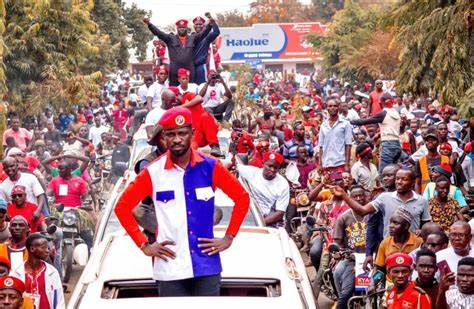In a chilling descent into authoritarianism, the Uganda Police Force’s latest decree against the National Unity Platform (NUP) is nothing short of a despotic power grab disguised as public safety measures. The resolutions from the police meeting with NUP leadership are a brutal, shameless assault on the fundamental rights of assembly and free speech, cloaked under the pretense of traffic regulations.
This is not law enforcement; it’s a gag order on NUP, led by Bobi Wine. The directives—no convoys, no excess passengers, no over-speeding—are pathetically transparent attempts to cripple NUP’s mobilization efforts. By enforcing these draconian restrictions, the regime aims to obliterate any opposition, ensuring its unchallenged stranglehold on power.
The suspension of NUP’s activities after the tragic accident on 31st May 2024 is a vile exploitation of a tragedy. The accident, which resulted in three deaths and two severe injuries, is being used as a convenient scapegoat for an outright crackdown on NUP’s activities. The police’s response, flaunting this tragedy to justify their oppressive measures, is both grotesque and disingenuous.
The police eagerly reviewed the CCTV footage of the 31st May procession to spotlight overloading, reckless driving, and other violations, conveniently ignoring the broader context of systematic harassment and obstruction faced by NUP from security forces. The indictment of Fred Lule, the driver involved in the accident, and the demonization of other NUP supporters are straight out of a tyrant’s playbook—demonize the opposition to divert attention from the regime’s failures.
The charges against Lule are extensive: reckless driving, causing death through reckless driving, using a motor vehicle in dangerous mechanical condition, and failing to report an accident. These charges, while legally sound on the surface, are enforced with a selective ferocity reserved only for political dissenters. When was the last time the UPF pursued such meticulous prosecution against regime loyalists who habitually flout traffic laws with impunity?
The resolutions from the meeting read like an authoritarian manifesto:
1. Stop carrying people on rooftops immediately.
2. Cease carrying excess passengers.
3. Abandon over-speeding.
4. Prohibit moving in convoys.
5. End harassment or provocation of security personnel.
6. Only traffic police should regulate traffic.
7. NUP leadership must control their members or face consequences.
Each point, while seemingly reasonable, is deployed with calculated malice. The ban on convoys is a direct assault on NUP’s ability to mobilize and campaign. It strips away the visibility and solidarity vital to any political movement, especially in a landscape dominated by state propaganda.
The demand that NUP leadership “take responsibility and prevail over the conduct of their members” is the most insidious resolution of all. It shifts the burden of law enforcement from the state to the political entity, criminalizing dissent. This ensures any future incidents can be conveniently blamed on NUP’s supposed inability to control its supporters, providing an endless pretext for further crackdowns.
As Bobi Wine and his team prepare for their Western Uganda tour, starting 15th July 2024, heightened surveillance and interference from state security are inevitable. The planned routes—Bundibujo, Ishaka – Bushenyi, Rukungiri, Ntugamo, and Isingiro—will undoubtedly be rife with police checkpoints and provocations, designed to disrupt and demoralize the opposition.
The Uganda Police Force’s citation of Article 212 of the Constitution and section 32(1) (b) of the Police Act to justify their actions is a grotesque abuse of legal provisions. These laws are wielded as blunt instruments to crush political dissent, perverting the police’s primary duty to protect life and property into a mission to shield the regime from legitimate political competition.
This latest development is not merely an attack on NUP; it is an egregious affront to democracy itself. It starkly reminds us that in Uganda, state power is ruthlessly deployed to silence opposition and entrench autocracy. The citizens of Uganda deserve far better than a state that uses the veneer of law and order to perpetrate oppression. The international community must take note and hold the Ugandan government accountable for these flagrant human rights violations.







Discussion about this post